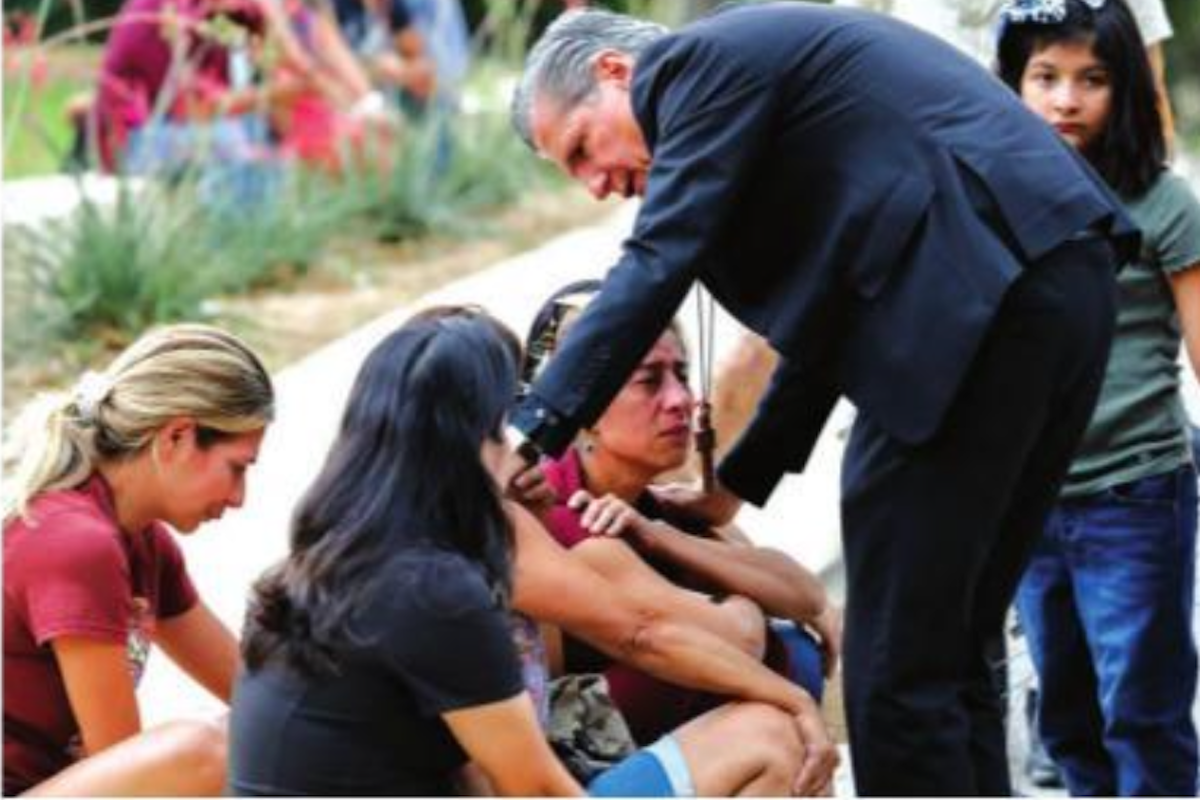Kash Patel sworn in as FBI Director, takes oath on Bhagavad Gita
Indian-American Kash Patel was officially sworn in as the ninth Director of the Federal Bureau of Investigation (FBI) on Friday, taking the oath on the Bhagavad Gita.
The mass murder at an elementary school in Uvalde, Texas, occurred behind a locked door as a posse of armed police waited outside, taking no action other than to handcuff a mother among the crowd of desperate parents urging them to do their duty while threatening others with a Taser.

It’s not easy to fathom a mindset wherein the second-deadliest school massacre in a nation’s history triggers the reaction that it would be a great idea to go ahead with a scheduled celebration of the very culture that facilitated the killings. Just another facet of American exceptionalism?
The mass murder at an elementary school in Uvalde, Texas, occurred behind a locked door as a posse of armed police waited outside, taking no action other than to handcuff a mother among the crowd of desperate parents urging them to do their duty while threatening others with a Taser.
Advertisement
A bit later some of the same parents were asked to provide samples of their DNA — apparently because victims hit by an expanding bullet from an AR-15 are often unrecognisable. DNA matching is required to ascertain the identities of the deceased — in this case, 14 girls and five boys aged nine to 11, and two teachers whose protective instincts helped save some lives.
Advertisement
What is also unfathomable is that an 18-year-old, considered insufficiently mature by the law to treat himself to a beer, can nonetheless purchase the most lethal assault weapons and ammunition available. One particular explanation for this ‘freedom’ is the lobbying power of the National Rifle Association — the organisation that went ahead at the weekend with its three-day convention in Houston.
It acknowledged the “horrific and evil” nature of the crime. It offered its “deepest sympathies” to the bereaved families before a conga-line of featured speakers — including Donald Trump and the equally despicable Texas Senator Ted Cruz — regurgitated the tired old arguments about why even the mildest restrictions on the constitutional right to possess and wield lethal weapons would be tantamount to anathema.
Conveniently, there was no notable mention of the Tops grocery store in Buffalo, where a white supremacist gunned down 10 African Americans, live streaming his accomplishment in keeping with the methodology — and the ‘Great Replacement’ philosophy — of the Australian perpetrator who murdered 51 people in two mosques in Christchurch three years ago.
‘The Great Replacement’ is not a myth. It most certainly occurred during the colonisation of North America: the genocide against Native Americans doesn’t require any fresh investigation, and historical texts abound in gruesome details. But does reading them involve an encounter with ‘Critical Race theory’? Heaven forbid! The replacement isn’t specific to that continent, of course. It occurred in Australia and South America too, and to some extent in Asia and Africa. Speaking of the latter, it’s the African- American past that mainly figures in the fairly incredible debate over whether what happened ought to be plainly acknowledged or blithely whitewashed. It’s not just the Buffalo massacre, though, that can be traced back to the sordid history of slavery before and after independence. A number of key clauses in the US constitution — including the sacrosanct Second Amendment, treated by some as if it were inscribed on stone by divine imperative rather than inserted by a bunch of slave-holders — reflect what ought to be considered anachronistic concerns.
The contemporaries of the founding fathers needed guns initially to steal territories from Native Americans, and later to keep their African slaves in line. Even the earliest police services were invented to sustain slavery. Perhaps it’s no coincidence that saving lives — even children’s lives — isn’t a priority for the modern, heavily armed and armoured police departments. They are better at taking lives. The second anniversary last month of George Floyd’s death served as a useful reminder As for all the talk about gun reform that gathers pace for a few days in the wake of tragedies, nothing much comes of it. Columbine did not lead anywhere. A temporary ban on assault weapons expired after a few years. Even Sandy Hook, where the victims were exceptionally young, led to little more than thoughts and prayers. More recently, Parkland produced an impressive national movement. But nothing meaningful followed.
Amid all the commentary I have lately come across, often expressing what’s been said many times before and shall no doubt be repeated, one comment — by the American writer Hamilton Nolan — kind of nailed it: “The cold truth,” he wrote in The Guardian, “is that our political system does not care about dead children; it cares about money.
“We don’t have gun control for the same reason we don’t have many other things that are plainly necessary and good … like public health- care: because not having those things enables a certain group of people to get rich. And that class of rich people funds an even smaller class of politicians, who are tasked with protecting their interests in exchange for living the nice life of a congressman or governor.” It’s not all that complicated. But will it ever change?
Advertisement